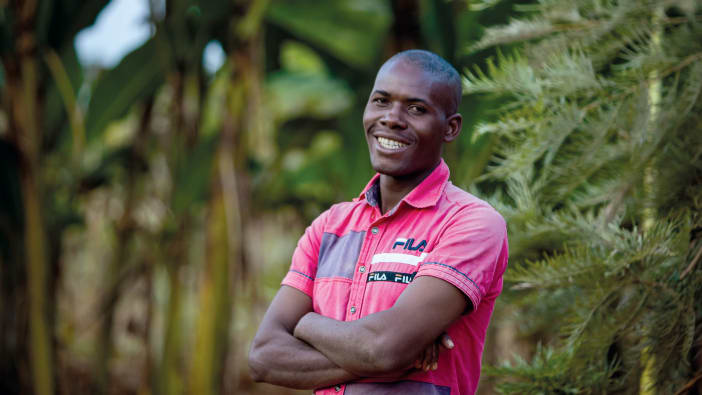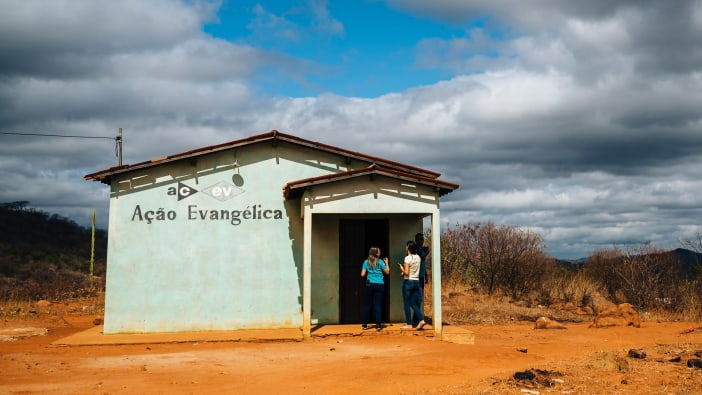We are all aware of many kinds of problems in our world - both on a global scale and in our own local situations. We see violence, poverty, prejudice and selfishness and a growing divide between rich and poor - not just between countries, but also within countries. Many people are searching for hope and spiritual direction. Many Christians believe that they cannot simply turn away from these problems and concentrate on worshipping God. Just as Jesus came into this world and became fully involved, so must they as God's people. What should the role of the church be in development?

Articles
Holistic change in our communities
We are all aware of many kinds of problems in our world - both on a global scale and in our own local situations. We see violence, poverty, prejudice and selfishness and a growing divide between rich and poor. But many people are searching for hope and spiritual direction
2002 Available in English, French, Spanish and Portuguese

Photo: Mike Webb/Tearfund
The good news is that, despite all its faults, the church is the way God has chosen to carry out his work in the world. Holistic change is all about transforming the world and the lives of people so that relationships with God, others and the environment are restored as God intended. There are many different terms used to describe this process: integral mission, holistic transformation or wholistic development. The words holistic change in our communities are perhaps easiest to understand. Holistic means combining different aspects so that they work together, bringing a 'wholeness' about development in people and communities.
Where the church fits in
When Christians and churches carry out holistic change, the results can bring a wonderful transformation in people's lives. For example, the work of ASHA in the slums of Delhi and of Armonía Ministries in Mexico City has brought new hope, confidence and improved living conditions for people in their communities and deepened the faith and witness of the church. This 'wholeness' is often lacking. There are a number of challenges in using a holistic approach to development:
Challenge 1: Churches focus only on spiritual issues.
Danladi Musa is a Regional Advisor for Tearfund, based in Jos, Nigeria. He comments, 'In many African countries, the local church is not usually involved in development. Instead, development departments are set up and are given the responsibility for carrying out development programmes. The local churches rarely see development as part of their work. Rather, they see themselves as the beneficiaries of these programmes. Most local churches see their role as limited to evangelism, teaching and discipleship, without any understanding of a holistic approach. Little or no effort is made to mobilise communities to take action to solve common problems that affect people.
C René Padilla of Kairos confirms this viewpoint with the findings of a recent study. He writes, 'a study of evangelical churches in Buenos Aires, Argentina, by the Kairos Foundation, confirmed that church leaders there believe the work of the church is to increase the number of believers and to plant new churches. They believe that everything else concerning serving the practical needs of their communities, comes second - possible but not essential. We disagree with this view.'
Danladi comments, 'The result is that the church is no longer the "salt and light" of the community. Churches tend to be inward looking, with little influence on their local area. Churches must be prepared to go out and listen to the people, find out what their needs are and work with them to meet these needs. In order to work effectively, the church must first of all be a model of the kingdom of God in every part of life. Loving one another should result in social justice, righteousness and economic prosperity.'
Challenge 2: Practical development work ignores spiritual issues.
Anthony Titley, Desk Officer with Tearfund's Asia team, comments, 'Many Christian organisations in Asia run holistic development programmes which do not involve the church. As holistic development, by definition, includes spiritual aspects, it would be interesting to know how they see the nature of their spiritual contribution.'
The church is not just a building where Christians meet. It is the community of Christians themselves. Christians should be involved in every aspect of life in their communities, practically sharing the love of God with their neighbours.
Challenge 3: Development workers become specialised in just one area of work.
As René Padilla comments, 'God's work includes every aspect of life, including human rights, caring for God's creation, better working conditions, health, education or housing.' The church's work should not concentrate on just one area of need, such as health or agriculture and ignore other issues.
When Jesus was asked what it meant to live as a good neighbour, he told the story of the Good Samaritan (Luke 10:25-37). When a man was attacked by robbers and left for dead by the roadside, he was ignored by religious leaders. They would have feared that touching the man would make them unclean and unable to attend to their religious duties. Instead, a Samaritan man (a despised foreigner) helped him, caring for his wounds, providing for his transport, for his accommodation and food and future practical needs in every way. This practical caring for the needs of the whole person was the way in which Jesus indicated we should love our neighbours.
The challenge to Christians
Tearfund is part of the Micah Network - an international group of Christians committed to integral mission among the poor.
Saul Cruz of Armonía Ministries, Mexico is a member of the Micah Network. He sums up his understanding of integral mission very simply: 'In John 10:10 Jesus describes his work: "I have come that they may have life, and have it to the full." This should be the basis for holistic Christian development work based on an attitude of service using Jesus as our model. Let us keep learning as we serve, walking alongside the poor until we reach our eternal home.'
'Encouraging and sometimes re-educating the church so that it builds a close relationship between outreach and service cannot be achieved overnight. It is a process which takes time, sometimes a lot of time,' emphasises René Padilla.
We hope you will find much to challenge, consider and inspire you as you read this issue. A number of contributors share their thinking and experiences of seeing holistic change in action.
With many thanks to René Padilla, Saul Cruz, Danladi Musa and Anthony Titley for sharing their thinking on these issues.
Share this resource
If you found this resource useful, please share it with others so they can benefit too.

Subscribe to Footsteps magazine
A free digital and print magazine for community development workers. Covering a diverse range of topics, it is published three times a year.
Sign up now - Subscribe to Footsteps magazine






